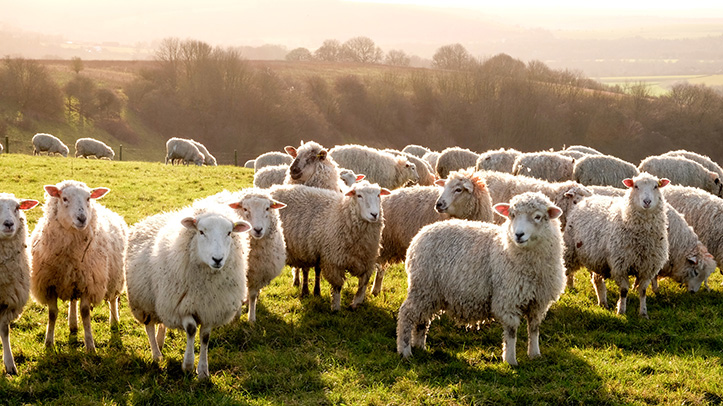From success with control of sheep scab to the creation of a new podcast series, the Sustainable Control of Parasites in Sheep (SCOPS) group said it is delighted with what has been achieved in 2023 – and looks forward to more in 2024.
Kevin Harrison, Gloucestershire sheep farmer and SCOPS chair, said: “SCOPS has always been a very active group, achieving a huge amount with few resources, but it feels like 2023 has been even busier and impactful than previous years.
“Since the news broke that there was resistance to the injectable (ML) treatments for scab in 2018, SCOPS has been heavily involved in promoting responsible scab control. In the last couple of years this has come to fruition, with a huge increase in sheep scab activity in all the devolved nations.”
Mr Harrison continued: “In England, the RDPE-funded ‘For Flocks Sake’ programme saw 300 sheep farmers in three regions come together, using the Elisa blood test and coordinate treatments. Preliminary results show the prevalence of scab in these areas has fallen dramatically after just one full season.
“In Scotland, there are projects running on Lewis and Harris and other groups are coming together. In Northern Ireland a blood testing programme has uncovered the true level of scab, and in Wales an eradication project began earlier this year. SCOPS is thrilled with this level of activity and is now working with other groups to develop a scab control plan to take us to 2030, building on the lessons learned in recent years and encompassing the whole of the UK.”
With the various scab initiatives, and as a response to ML resistance, SCOPS has also worked hard this year to raise awareness of the need for safe and effective use of organophosphate (OP) dip.
Lesley Stubbings, independent sheep advisor and SCOPS spokesperson, said: “With resistance to the MLs confirmed, OP is our only line of defence and we must guard against resistance to it. As an industry, we are now using more OP and it is important this is always done safely from both a human and environmental perspective.
“SCOPS was instrumental in updates to the Code of Practice for Mobile Dippers, which outlines the responsibilities of farmers, prescribers and contractors. It provides a framework for professional service and serves as a reminder that it is illegal to use an OP in a jetter or a shower.”
This year has also seen the implementation of a Worming Treatment Check (WTC) within the Vet Review element of Defra’s Animal Health & Welfare Pathway.
Similar testing is now also available in Scotland, and SCOPS has worked hard to influence both schemes to be practical, meaningful and aligned with SCOPS principles.
Ms Stubbings explained: “The WTC is designed to check how effective a worming treatment has been, which means it also covers a discussion with your vet about dosing accuracy and the use of faecal egg counts. If carried out correctly and at the right time, it can give an indication if resistance is present, prompting further investigation.
“As expected, there have been some teething problems. Common problems include faecal samples that are not fresh, samples from ewes rather than lambs and/or too few or too many days between treatment. The problem is that a poor test will result in inaccurate results and that can lead to you making the wrong decision regarding wormer choices.
“SCOPS has worked hard to provide useful guidance that is relevant to English farmers accessing the Defra scheme, but also anyone wanting to check a worming treatment has been effective.”
Heading towards the end of the year, fluke is more on the minds of producers than roundworms – and so SCOPS continues to review its liver fluke resources, including guidance on testing for the parasite to avoid getting caught out this winter and into the spring, and will issue warnings throughout the risk period.
Ms Stubbings said: “It’s going to be another roller coaster ride for liver fluke this season following the extremes of weather over the summer and autumn, coupled with huge variations across the country.
“Testing is key to deciding if and when to treat livestock, as we expect the main risk period to be much later in some areas this year. It’s important not to get caught out relying on one negative test.”
Another key focus for SCOPS in 2023 has been the increasing interest in the impact of veterinary medicines on the environment. Many of the SCOPS principles for slowing down the development of anthelmintic resistance, which encourage reduced and/or more targeting use of treatments, dovetail with actions to reduce environmental impact.
Having run a webinar on the topic in February and held various discussions with its cattle equivalent, the Control of Worms Sustainably (COWS), SCOPS will continue raising awareness of this topic in 2024.
Mr Harrison concluded: “In what has been a very busy year, SCOPS is particularly proud to have also launched a new podcast series, which I urge vets, advisers and farmers to download. There are four episodes so far and they’re all a really great listen.
“Pop one on when you’re travelling between jobs or have some spare time. They’re informative and entertaining – and there may well be more in 2024!”


